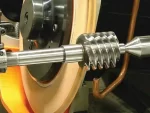Why cubic boron nitride abrasive is better for grinding than diamond
Grinding is a crucial process in many industries, including manufacturing, automotive, aerospace, and more. The choice of abrasive material can greatly impact the efficiency and quality of the grinding operation. While diamond has long been considered the go-to abrasive for grinding applications, cubic boron nitride (CBN) abrasive has emerged as a superior alternative. In this article, we will explore why CBN abrasive is better for grinding than diamond.
To understand why CBN abrasive is preferred over diamond, it is important to delve into the properties and characteristics of both materials. Diamond is known for its exceptional hardness, making it an excellent abrasive for many applications. However, when it comes to grinding ferrous materials such as hardened steels, superalloys, and cast iron, CBN abrasive outperforms diamond in several key aspects.
One of the primary advantages of CBN abrasive is its superior thermal stability. Grinding generates a significant amount of heat, which can cause the abrasive material to degrade or even melt. CBN has a remarkable ability to withstand high temperatures without undergoing chemical reactions or losing its cutting edge. This thermal stability allows for faster cutting speeds and higher material removal rates compared to diamond. Additionally, it results in reduced tool wear, prolonging the life of the grinding wheel.
Another factor that sets CBN apart from diamond is its exceptional chemical inertness. Unlike diamond, which can react with certain materials at high temperatures, CBN remains chemically stable under most grinding conditions. This inertness ensures minimal interaction between the abrasive and the workpiece, preventing the formation of built-up edge and reducing the risk of surface damage. As a result, CBN abrasive delivers superior surface finishes and dimensional accuracy, making it ideal for precision grinding applications.
Furthermore, CBN abrasive exhibits excellent fracture toughness, which is the ability to resist cracking and breaking under stress. This property is particularly important in grinding operations where the workpiece material may contain hard inclusions, such as carbides or ceramics. CBN’s high fracture toughness allows it to withstand these challenges, maintaining its cutting performance and preventing premature wear or failure.
In addition to these technical advantages, CBN abrasive offers practical benefits in terms of cost-effectiveness. While diamond is an extremely valuable material, CBN is more affordable and readily available in various forms, including grinding wheels, inserts, and powders. This accessibility makes CBN a cost-effective solution for grinding applications that require high-performance abrasives.
In conclusion, cubic boron nitride abrasive surpasses diamond in many aspects, making it the preferred choice for grinding ferrous materials. Its exceptional thermal stability, chemical inertness, and fracture toughness make it highly efficient and reliable in demanding grinding operations. Furthermore, CBN abrasive is more cost-effective, providing a practical solution for industries that require superior grinding performance. As technology continues to advance, it is likely that CBN will continue to gain prominence as the go-to abrasive for grinding applications.
.webp)
